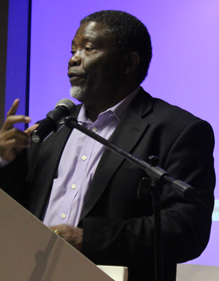|
Getting your Trinity Audio player ready...
|
 By Valencia Talane
By Valencia Talane
If your child attends one of South Africa’s public schools you have between now and March 2015 to think hard about who will manage his or her school for the next three years, and how. Parents must participate in all aspects of the management of their children’s schools in order for school governing bodies (SGBs) to carry out their purpose.
This was the sentiment shared at the latest Education Conversations held at the University of Johannesburg on Tuesday. The events are held once every quarter and are a collaborative effort between the university, NGO Kagiso Trust and City Press, who is the media partner.
The next round of SGB elections takes place in March 2015 and those elected will be in office for a three-year term ending in 2018.
Stakeholders must get involved
Speakers at the latest event included Ronald Menoe, Corruption Watch stakeholder relations manager; Matakanye Matakanye, the chairman of the national association of school governing bodies; and Nkosana Thakgedi from the national department of basic education’s schools governance and management unit.
Thakgedi outlined the government’s initial purpose for SGBs, emphasising that members of the structure were always meant to keep the interests of learners at the centre of the work that they do.
“At the beginning [of the new government], we had to make sure that each and every stakeholder in education has got space and a platform to get involved in the decision-making in education.”
However, the education of our children, said Thakgedi, is not an isolated societal matter. “It has to address the rules of a country because it is a societal responsibility.” At the time that the policy around which the structure and purpose of SGBs was formulated, the government had to look at which societal stakeholders can spearhead discussions and policymaking around education.
A stipulation of the South African Schools Act says governing bodies may include communities around schools, as well as parents and learners who view the development of the school as their primary objective.
“Unfortunately the financial responsibility of the SGB is misunderstood by some, who think they can abuse it for their personal benefit.” He added that the ideals of the policy of SGBs is often compromised by those people who see schools as cash cows that can advance their personal interests.
The SBG is a community effort
Pointing fingers at individual members of SGBs was not very helpful either, noted Matakanye, because the election of the bodies’ members is a community effort. This means that all of the school’s stakeholders, including the community around it, are affected by an SGB’s conduct and influence it too.
“When we insult SGBs we insult ourselves, because SGBs are the gatekeepers [of education],” he said, emphasising that parents cannot remove themselves from SGB work. “You may be a doctor, a lawyer or any other profession, but when you leave home you are nothing more than a parent.”
Matakanye said a lot of thought has to go into whether the right skills within an SGB are being fully utilised for the right areas.
Thakgedi agreed: “The training of SGBs remains one of the challenges faced by the department. It is available in all provinces, but unfortunately takes a one-size-fits-all approach, and does not address the issues of a particular SGB.
“We have designed guidelines on areas where SGB members have to be trained. Circuit managers in provinces can choose from those areas and develop SGBs based on their needs.”
He added that the downside of this is that SGBs by law only stay in place for three years, so some training is lost when new members enter.
“Some SGB members go in for their own interest. They know that schools have got finances and ‘I’ve got a polish business, so I’ll use my position in the SGB for my company to go forward’,” said Thakgedi.
Corruption in schools
Menoe’s address focused on the way that corruption manifests itself in schools – he said educators and SGB members often highlight what is potentially corrupt conduct without fully understanding its dangers.
“Administrative staff in schools also report to us, and speak of how they have to help generate false invoices and quotations for work done in the school,” he said.
“Ninety-eight percent of reports relating to the signing of blank cheques implicate principals, while another 15% of these implicate SGB members.”
SGB members who abuse the system to benefit themselves usually do so by identifying the gaps in the policies relating to procurement.
“We encourage provincial education departments to drive visible public education campaigns,” said Menoe. “When I log on to websites of provinces there is plenty of relevant information on SGBs that does not reach parents on the ground.”
Another recommendation was for the department to properly vet the standards of forensic firms they hire to conduct investigations, because they need to produce the best quality of work.
Basic education minister Angie Motshekga is quoted on her department’s website as saying “After the national elections, SGB elections are the most important voting process in this country. This means there are about eight-million adults who can unleash their energies to get the education system to flourish.“








